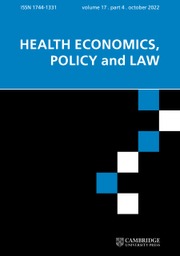Article contents
How to fairly allocate scarce medical resources? Controversial preferences of healthcare professionals with different personal characteristics
Published online by Cambridge University Press: 10 June 2021
Abstract
The scarcity of medical resources is widely recognized, and therefore priority setting is inevitable. This study examines whether Portuguese healthcare professionals (physicians vs nurses): (i) share the moral guidance proposed by ethicists and (ii) attitudes toward prioritization criteria vary among individual and professional characteristics. A sample of 254 healthcare professionals were confronted with hypothetical prioritization scenarios involving two patients distinguished by personal or health characteristics. Descriptive statistics and parametric analyses were performed to evaluate and compare the adherence of both groups of healthcare professionals regarding 10 rationing criteria: waiting time, treatment prognosis measured in life expectancy and quality of life, severity of health conditions measured in pain and immediate risk of dying, age discrimination measured in favoring the young over older and favoring the youngest over the young, merit evaluated positively or negatively, and parenthood. The findings show a slight adherence to the criteria. Waiting time and patient pain were the conditions considered fairer by respondents in contrast with the ethicists normative. Preferences for distributive justice vary by professional group and among participants with different political orientations, rationing experience, years of experience, and level of satisfaction with the NHS. Decision-makers should consider the opinion of ethicists, but also those of healthcare professionals to legitimize explicit guidelines.
Keywords
- Type
- Article
- Information
- Copyright
- Copyright © The Author(s), 2021. Published by Cambridge University Press
References
- 1
- Cited by




